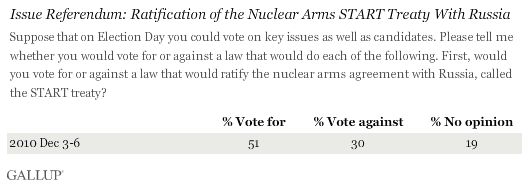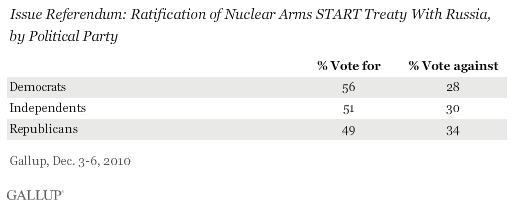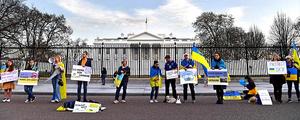PRINCETON, NJ -- If given the opportunity to vote on the matter, 51% of Americans would ratify the START nuclear arms agreement with Russia and 30% would vote against it, while 19% are undecided. Maine's two moderate Republican senators publicly announced their support for ratification on Friday morning, although it is still uncertain whether the Senate will vote on the treaty before the end of the year -- as President Obama has urged.

The START treaty is one of the potential issues on the lame-duck Congress' agenda, but has to a degree been overshadowed by the focus on tax cuts and the "Don't Ask, Don't Tell" legislation. Gallup's question about the treaty was included in a series of referendum questions in Dec. 3-6, 2010, Gallup Daily tracking. The question did not measure the degree to which Americans are familiar with the particulars of the treaty, but nevertheless provides a measure of their top-of-mind reactions to the issue of its ratification when described as a "nuclear arms agreement with Russia."
Some Senate Republicans have expressed concerns about the treaty, although former Republican President George H.W. Bush and former Secretary of State Colin Powell have in recent weeks publicly endorsed it. While there are not major partisan differences in support among Americans by party, Democrats are slightly more in favor than Republicans.

Previous Gallup polling shows that Americans give the START treaty mid-range priority among a list of six issues that the lame-duck Congress could focus on. Forty percent say it is very important that Congress complete action on the START treaty before the end of the year. This places it well below the importance given to action on the estate tax, the Bush tax cuts, and extending unemployment benefits, but above the priority given to "Don't Ask, Don't Tell" and the DREAM Act.
Implications
In addition to the new Gallup referendum question, a number of questions asked by other polling organizations find majority support for the idea of ratifying the START treaty. As an example, a Nov. 29-Dec. 2 CBS News poll asked about the general concept of the U.S. and Russia "coming to an agreement to limit nuclear weapons," and found 82% support. A CNN/Opinion Research poll conducted in mid-November explicitly reminded respondents that "President Obama and the president of Russia recently signed a treaty to reduce the number of nuclear weapons of each country," and found 73% support for Senate ratification.
Americans attach mid-level importance to ratifying the treaty before the end of the year, suggesting that failure to do so would be less consequential than failure to act on legislation relating to taxes and unemployment.
Survey Methods
Results for this Gallup poll are based on telephone interviews conducted Dec. 3-6, 2010, on the Gallup Daily tracking survey, with a random sample of 1,003 adults, aged 18 and older, living in all 50 U.S. states and the District of Columbia, selected using random-digit-dial sampling.
For results based on the total sample of national adults, one can say with 95% confidence that the maximum margin of sampling error is ±4 percentage points.
Interviews are conducted with respondents on landline telephones (for respondents with a landline telephone) and cellular phones (for respondents who are cell phone-only). Each sample includes a minimum quota of 150 cell phone-only respondents and 850 landline respondents, with additional minimum quotas among landline respondents for gender within region. Landline respondents are chosen at random within each household on the basis of which member had the most recent birthday.
Samples are weighted by gender, age, race, education, region, and phone lines. Demographic weighting targets are based on the March 2009 Current Population Survey figures for the aged 18 and older non-institutionalized population living in continental U.S. telephone households. All reported margins of sampling error include the computed design effects for weighting and sample design.
In addition to sampling error, question wording and practical difficulties in conducting surveys can introduce error or bias into the findings of public opinion polls.
View methodology, full question results, and trend data.
For more details on Gallup's polling methodology, visit www.gallup.com.
